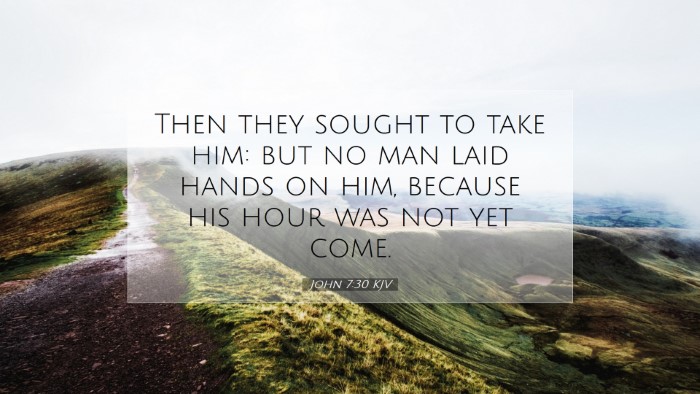Bible Commentary on John 7:30
In John 7:30, we encounter a profound moment in the narrative of Jesus’ ministry. The verse reads:
“Then they sought to take him: but no man laid hands on him, because his hour was not yet come.”
Contextual Analysis
This verse occurs during the Feast of Tabernacles, a significant Jewish festival that drew many pilgrims to Jerusalem. Jesus had been teaching in the temple, provoking both curiosity and hostility among the people and the religious leaders. The environment was charged with tension as His authority was questioned, and His identity as the Messiah was both dismissed and accepted by different groups.
Thematic Insights
Different commentators provide valuable insights into the themes encapsulated in this verse:
-
Divine Timing
Matthew Henry emphasizes the significance of “His hour.” Jesus operated under divine authority and timing; His mission was governed by God’s sovereign plan. The attempt to seize Jesus illustrates human opposition to divine purpose, but His hour had not yet come, indicating that God’s will prevails over human intentions.
-
Human Resistance vs. Divine Protection
Albert Barnes notes that the intention to arrest Jesus showcases the hostility He faced and the resistance from religious authorities. However, despite their plans, divine protection ensured that “no man laid hands on him.” This reflects not only His authority but also the inadequacy of human efforts to thwart God’s plans.
-
Messianic Identity
Adam Clarke draws attention to the implications of Jesus’ presence and teaching. The crowd's divided response signifies the ongoing revelation of His messianic identity. The cravings of the people, the conspiracy of the leaders, and God's orchestration work together in this moment to underscore the divine nature of Christ’s mission.
Exegetical Considerations
The phrase “they sought to take him” reveals the depth of animosity toward Jesus among the Jewish leaders. Henry indicates that their eagerness to seize Him stemmed from a combination of fear, envy, and a desire to maintain their authority.
Furthermore, the statement “but no man laid hands on him” reflects a vivid theological principle: God’s sovereignty is at the forefront. Barnes adds that although human beings may plot and devise plans against God’s anointed, their efforts are futile when confronted by divine will.
Applications for Today
This passage has profound implications for preaching and practical theology:
-
Trust in God’s Timing
Ministers and believers alike can draw strength from understanding that, like Jesus, we operate under a divine timeline. Patience in God’s plan is paramount, and we are reminded that our efforts must align with God’s appointed time.
-
Facing Opposition
In the face of resistance and challenge, Christians are reassured that God’s protection is ever-present. The struggles of today echo the experiences of Jesus, and through understanding this, believers can find courage in their convictions.
-
Affirmation of Christ
The duality of acceptance and rejection that Jesus faced is still evident in today’s world. The commentary on the multifaceted responses from the people can inspire discussions on how we present Christ in our contexts, urging both clarity and conviction in our representations of Him.
Conclusion
John 7:30 serves as a pivotal moment in the Gospel of John, underscored by themes of divine authority, timing, and the nature of human opposition to God’s plan. The insights from esteemed commentators like Matthew Henry, Albert Barnes, and Adam Clarke enrich our understanding and application of this verse, providing a well-rounded theological reflection suitable for pastors, students, theologians, and scholars. As we reflect on this passage, may we draw nearer to the heart of Christ and His mission, understanding that even in the face of adversity, God's purpose shall prevail.


